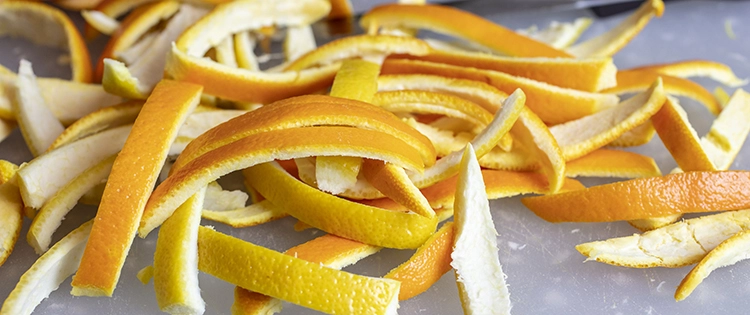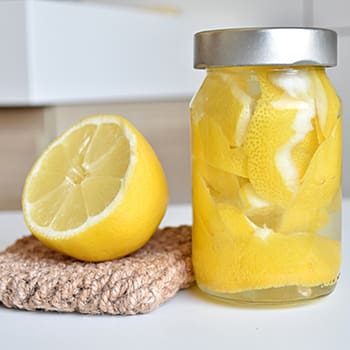You’ve made a beautiful pitcher of lemonade, but now it’s time to toss your peels and- No! Stop! What are you doing?
While you stand there holding your peels over the trash, absolutely baffled as to why I’d tell you to stop, settle in, and take a look at what you’re missing out on. We’re pretty sure we can convince you to save those peels rather than waste them. Let’s get started.
Candy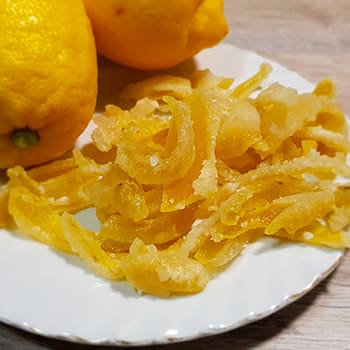
Every citrus fruit has a delicious peel waiting to be turned into candy. The process is simple, there are thousands of recipes online, and lemon peel is especially tasty. While we realize that not everyone reading this can have candy (I am, in fact, part of the Diabetes party line, too) or must eat it in small amounts, that’s probably the most impressive thing about candied citrus peels. They last for ages and are in correct storage.
Lemon peels also pair beautifully with orange and grapefruit peels in a jar, dried and candied, with a festive ribbon. Not only do these peels contain necessary vitamin C to help your friends get through the winter, but these old-timey candies offer a nostalgia that a box of store-bought candy simply doesn’t.
Insect Repellent
Using lemon peels as an insect repellent is a natural and eco-friendly method to deter pests like ants, mosquitoes, and flies. The strong citrus scent of lemon contains compounds that insects find unpleasant, making it an effective deterrent.
You can rub fresh lemon peels on surfaces like door frames and window sills, place them in areas prone to insect activity, or create a lemon-repellent spray by boiling lemon peels in water and straining the liquid. Additionally, making sachets with dried lemon peels and other insect-repelling herbs is a convenient way to keep pests at bay in closets and drawers. Lemon peels can also be used outdoors during picnics or camping trips to help repel mosquitoes.
While lemon peels can be part of an effective insect repellent strategy, their effectiveness may vary depending on factors such as the type of insect and environmental conditions.
Fire Starter
Using lemon peels as fire starters is a natural and efficient method for igniting fires in fireplaces, outdoor pits, or campfires. After thoroughly drying the lemon peels to increase their flammability, strategically place them among the firewood or kindling.
When lit, the natural oils in the peels facilitate combustion, aiding in igniting the surrounding wood. This method not only eliminates the need for chemical-laden commercial fire starters but also adds a pleasant citrus aroma to the fire.
Dishwasher Cleaning
Lemons are one of the best cleaning tools in the natural world. In fact, it’s why so many companies make their harsh cleaning chemicals “lemony fresh” scented. We recognize it as a natural cleaning agent and know that we can use it to make things seem sparkling clean. Isn’t that neat?
If your dishwasher smells gross after a rough load goes through it, place some chunky-cut lemon peels in your utensil cleaning tray and snap the lids down to secure it. Run a normal cycle; whichever cycle is a full cycle but also the shortest version in your machine. Make sure it has hot water flowing through it. When you open your machine, it should be cleaner than it’s looked in quite some time.
Related: Home Cleaning Mistakes That Can Cost You Your Health
Why? The acids from the lemon help break down caked-on grease, mildew, and other nasty things that are lurking in your dishwasher. And don’t feel bad; this happens to everybody. Dishwashers are a known source of grossness in your kitchen, much like any appliance meant to clean; they still need to be cleaned, too.
If you have bits of pith left in your dishwasher, we recommend disassembling it and doing a full, manual clean. Not only do lemons help you clean up your dishwasher, but they also let you know that the system is not draining correctly and that it is leaving bits and pieces all over your dishes, even if you can’t see them. A properly spraying and draining dishwasher will not have pith and fruit left inside the machine. The peels should still be there and can be thrown away.
Vinegar Cleaning Supplement
If you, like me, prefer to clean your house with vinegar instead of bleach or other harsh products, you may get tired of the vinegar smell after a while. Sure, we know that it’s naturally detoxifying and it makes everything sparkly and pretty. Still, you get a kind of ketchup-y vibe after a while and it can be a bit much.
Never fear, your lemon peels are here. If you pour your vinegar into a jar with lemon peels (no drying necessary) for a few weeks before using it, you’ll have that fresh citrusy scent following you everywhere. We usually add a little rosemary sprig or another spicy scented herb to the mix, too, just to have a new scent to enjoy other than plain old “clean”.
Even better, if you do decide to do this, your chickens or pigs may love to eat your lemon peels afterward. While some discerning poultry says no thank you, many will scoop up the chance to balance their crop’s PH with some vinegar-touched lemon peels. I don’t recommend pouring a pile of them into a pen of chickens, but 1-2 strips of lemon peel per adult chicken will be fine. Just don’t make it a weekly event; try for less than twice a month.
Zest for Cooking
“Lemon zest”, you mutter, wandering through the spice and baking aisle of the store. Who the heck keeps lemon zest in their kitchen?
You do, you just don’t realize it yet.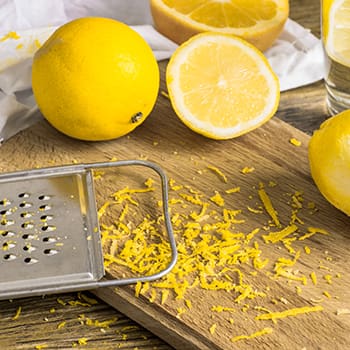
If you’ve just made something with lemons and you still have the peel, throwing it away can cost you quite a bit. Have you priced lemon zest at the store lately? Yikes.
Freeze your lemon peels until you have enough to run a round of them in your dehydrator. I can’t begin to tell you exactly how many of those that will be since dehydrators run a very large gamut in terms of size and lemon peels tend to be a variety of sizes, too. You know your machine best.
Related: Lemons
Dehydrate your lemon peels until they’re as crisp as potato chips. Using a food processor or even a coffee grinder (a new one that hasn’t been used for coffee yet), grind your lemon peels until you have a “sandy” consistency. You can go with a lighter grind if you wish, but I personally prefer it to be about the size of sand/salt in my hands just so it’s a little more multi-use.
But yes, that’s all you’re buying at the store. These peels will keep on the shelf for months and months if fully dehydrated, just like the ones from the store. And you’ll have them any time you want to make a fancy lemon cake, put something nice on your fish dinner, or use it in any of thousands of other cooking situations.
…Or toss a little of it in your cleaning vinegar or tea, too. It’s pretty flexible stuff.
Are you enthusiastic about using every bit of everything that you buy, especially lemon peels? Did we miss a way that you use lemon peels so they don’t just end up in the trash (or the compost)? Comment down below; we’d love to hear from you. And, as always, Happy Homesteading!
You may also like:
Vegetables You Can Grow In Your Attic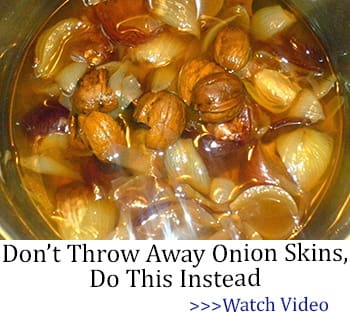
10 Nutritious Plants Native Americans Ate When They Had No Food (Video)
Stop Storing These 10 Foods For Emergencies
Dwarf Fruit Trees You Can Grow In A Tiny Space
15 Things You Should Teach Your Children That Can Save Their Lives
